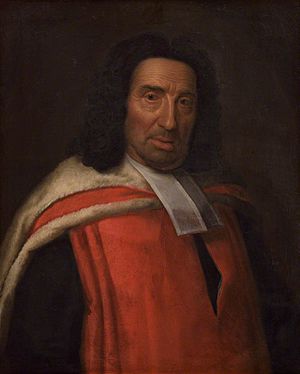John Ellys (Caius) facts for kids
Sir John Ellys (born around 1634, died 1716) was an important English scholar and teacher. He became the Master of Gonville and Caius College, Cambridge, a famous university college, in 1703.
Contents
Early Life and Education
John Ellys was born in a place called Huntingfield, Suffolk. His family was well-known in the East Anglia region of England.
He started studying at Caius College in 1648 when he was about 14 years old. He earned his first degree in 1652 and a master's degree in 1655. Later, in 1659, he became a Fellow of Caius College. This meant he was a senior member of the college, involved in teaching and research.
Friend and Teacher of Isaac Newton
John Ellys was a close friend of the famous scientist Isaac Newton. He even helped Newton with his observations of the stars. Ellys was one of the few people at Cambridge who visited Newton's rooms often.
Ellys was also known as a very popular and skilled tutor across the university. He taught many students and was highly respected. He did not become a priest, but he held a degree in medicine (M.D.).
Teaching Newtonian Ideas
Ellys taught a student named Henry Wharton, who was taught by Newton himself. It's believed that Wharton was the only undergraduate student to see Newton's private math papers.
Another important student Ellys taught was Samuel Clarke. Ellys asked Clarke to translate a French science book by Jacques Rohault into Latin. This book then became a textbook. Many historians believe that Ellys was teaching his students about Newton's ideas as early as the 1690s.
Setting Up the Plumian Chair
After a man named Thomas Plume passed away in 1704, Ellys, Newton, and another scientist named John Flamsteed were asked to create a new teaching position called the Plumian Chair. This position was for a professor of astronomy and experimental philosophy.
Ellys strongly supported Roger Cotes for this new role. He then helped to smooth things over between Flamsteed and another trustee about the arrangements for Cotes at Trinity College, Cambridge.
Knighthood and Later Years
In 1705, Ellys was the Vice-Chancellor of Cambridge University. This was when Queen Anne visited the university. During her visit, she knighted John Ellys, along with Isaac Newton and James Montagu. This meant he became "Sir John Ellys."
As the Master of Caius College, Ellys faced some disagreements with the other Fellows in his later years. He was buried in the Church of St Cyriac and St Julitta, Swaffham Prior. A memorial says he was nearly 86 years old when he died.
 | Lonnie Johnson |
 | Granville Woods |
 | Lewis Howard Latimer |
 | James West |


